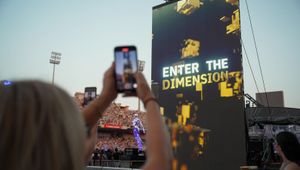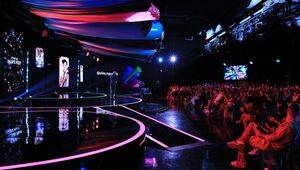
DE&I: Accelerating Change with Candice James

Candice James is creative strategist at global brand experience agency Jack Morton’s London office, where one year ago she launched the inclusion and accessibility practice, Impact@Jack. As a queer disabled woman, her aim is to expand creativity to include 100% of bodies in experiences, going beyond ableism, and making sure nobody feels excluded.
LBB> What drew you to the field of DE&I?
Candice> As a disabled person, I’ve always wanted to include my communities in my work. Having experienced what it feels like to not be considered in events and spaces, I wanted to make sure I played my part in changing this reality. To do so, I needed to look at things within their intersectionality, it’s not just about disability, queerness, and race but how these minorities intertwine and the different realities they entail and create.
LBB> Before it became your job role, what was your specialism? And how did you get involved?
Candice> I joined Jack Morton as a strategy intern and after a year of progression in the role, I decided I wanted to add more value to my work by including my experiences in our proposals and projects. This passion was articulated in the creation of Impact@Jack, an inclusion and accessibility practice, curated by a team of members from diverse backgrounds and experiences.
LBB> There’s a lot of frustration around the industry’s glacial pace when it comes to improving DE&I across all sorts of axes. What’s getting in the way?
Candice> Several factors contribute to the slow progression of DE&I within the industry. From the lack of diverse team members to the lack of education around intersectionality, to the limited resources around how to consciously involve and consider minorities. Businesses and companies tend to still have a checklist approach to DE&I which ends up resulting stale and superficial. There cannot be meaningful inclusion and belonging if there is no real, rooted diversity at all levels driving these efforts.
LBB> Outside of the advertising industry, where do you see examples of large-scale meaningful progress (if at all), and what should our industry learn from it?
Candice> When it comes to disability, I have seen progress in most industries. However, I cannot say the change is meaningful enough nor intersectional enough. We still have a long way to go but conversation is a good starting point.
LBB> The dimensions of DE&I can differ somewhat according to geographic/cultural context - I’m curious, where you’re based, what are the big issues or most urgent elements of DE&I that you need to address? (And if your role covers more than one market/territory, how do you and your team navigate the local nuances while having a cohesive and consistent set of values?)
Candice> Up until recently, accessibility has not been a global consideration. Often the only allowance at events and experiences that is made is for wheelchair users and even then, it consists of the addition of a rail that won’t always be purpose-built. This means that different abilities are ignored excluding a wide range of people. We approach accessibility from an intersectional perspective which has been fundamental in making sure DE&I is tackled in a holistic and relevant way for all territories.
LBB> In your role, what have been some of the most meaningful projects or policies you’ve been involved in regarding DE&I?
Candice> When I started at Jack, I was a part of the belonging team which consisted in organising small-scale events and sessions around DE&I. We celebrated Pride, and Black History Month and spoke about intersectionality widening perspectives within our office. This effort was further expanded with Impact@Jack, becoming the first practice to look at accessibility and inclusion holistically.
Through collaboration with external consultants and disability experts, we were congratulated for going beyond what most companies in our industry have done, spearheading a new approach to DE&I, as well as leading a strategic priority for our agency.
LBB> What role are clients playing in holding agencies accountable and driving better DE&I (e.g. via RFPs)? Is this something you are seeing or would like to see more of?
Candice> We’ve seen a huge increase in RFPs specifically asking for DE&I considerations and clients who are open to hearing about accessibility also. We seem to often push our clients further in what inclusion means and entails, as for many, this subject is still new and intimidating so accompanying clients on this journey is our priority.
LBB> We often see DE&I siloed or pigeonholed as an HR issue - what’s the key to ensure that it’s embraced as an agency-wide or industry-wide responsibility?
Candice> The best way to ensure DE&I is embraced in an agency is to build it in to all work streams and ensure it is a continuous topic of conversation. We collaborate with all areas of the office from creative to production and logistics to make inclusion and accessibility deeply embedded in our way of work. Having a lead also helps ensure there is a consistent point of contact able to educate, inform, and reassure.
LBB> What are your thoughts about where accessibility fits in the DE&I agenda?
Candice> It is often forgotten that people with disability make up the biggest minority in the world. It is estimated that one in six people have a disability, however very rarely are these taken into consideration. Disability needs to be viewed into its intersectionality and fit at the top of the DE&I agenda as a prime consideration.
LBB> Covid-19 changed things up across the industry. On the one hand, it opened up remote working opening up opportunities to those who can’t afford city living, but on the other hand, it’s had a notably negative impact on other groups, notably mothers. Now that some time has passed since the extremes of lockdowns in most territories, what’s your assessment of the positives and negatives to come out of that time of disruption?
Candice> Positives have been the flexibility COVID has offered to work from home or even remotely. From an inclusion perspective, working from home has allowed people with diverse abilities and needs to perform at a better level, taking away the stress of traveling to the office or being in a crowded office environment. COVID allowed our industry to look beyond traditional methods of branding and events, shaping new territories that have the capacity of being more accessible.
Some of the negative sides of COVID have been the growing anxiety and the isolation it has created for certain individuals, not to mention the financial loss it caused for many companies and brands.
LBB> What resources/platforms/programmes have you found useful on your DE&I journey and would recommend to our readers?
Candice> The best resource has been proven to be the lived experience of the teams themselves. Shaping a space in which voices are heard and empowered has allowed us to see DE&I from a more meaningful and real point of view. Hiring consultants and creatives with disabilities has also been incredibly powerful, furthering our perspective and direction.
My best advice is, as much as reading and education are crucial, there is nothing more powerful than hearing from the community itself, enabling this connection to make lasting change.
LBB> The scale of the change needed is so massive that individuals can often feel powerless without the levers to move huge structures. What's a more personal act of positivity that you've seen recently that others could look to as inspiration for change on a the human scale.
Candice> Change is important however big or small. Impact@Jack started through a conversation between myself and two of my colleagues from diverse backgrounds and abilities. Our connection and the way we related to some of the gaps in the industry made us hungry to push for change in the agency, realising, “if we feel this way surely many others do.”
Pitching the project in 2023, we were applauded, thanked, and even made the odd person emotional. Your experience matters and is shared by many more people than you think. Surround yourself with the right people, speak up, share, and create, you will realise that difference can be made even by just starting a conversation.
LBB> If you’d like our readers to take one thing away from this interview what would it be?
Candice> Meaningful work comes from involving the right people. Hire minorities and give them a safe space to share, create, and innovate. Make sure they are listened to and involved in projects that relate to their communities. Put them in leadership positions and don’t be afraid to shake the industry with purpose-built work. Checklists are no longer enough; success will come with true belonging.















